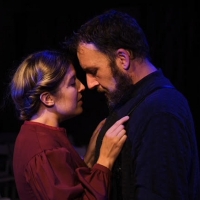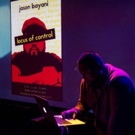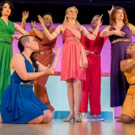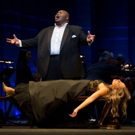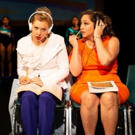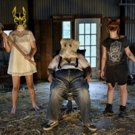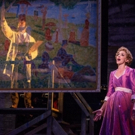Amy Tarver
.jpg?format=auto&width=200)
Through the years, Amy (Bradley) Tarver has been able to be apart of live theatre on stage and off. She started out volunteering locally at Sam Bass Community Theater before heading to New York City to study at The New York Conservatory For Dramatic Arts, the School for Film and Television. While in NYC, Amy worked on stage with the Afrikan Woman’s Repertory Theater, behind the scenes with Wide Eyed Productions and reviewed Off Broadway shows for nytheatre.com. Her passion and commitment helped bring new works to life from the ground up working with fresh ideas and fresh playwrights. She eventually went on to direct a collection of David Ive’s shows, A Mystery at Twicknam Vicarage and Babel in Arms, at the 14th Street Theater with the support of her colleagues at Wide Eye Theater Productions. After completing her acting education, Amy returned to Austin TX and continues her passion for the arts behind the scenes. As an active member of The Austin's Critics Table, Amy has reviewed live theatre for almost a decade. She strives to review productions as a whole - reviewing all the moving parts that make a show a masterpiece of living art.
MOST POPULAR ARTICLES
September 23, 2022
Navigating the lantern lit path to a small traditional log cabin in Northeast Austin, the house was packed to see Archive Theater’s reimagined rendition of MACBETH. The cracked wooden windows to beat the heat, and the creative thrust staging ignited a sense of comradery for the drama needed for Shakespeare's famous Scottish play. Many are familiar with the story of MACBETH - three witches tell the Scottish general Macbeth that he will be King, resulting in murder and mayhem encouraged Lady Macbeth, the chaos quickly spirals out of control - but Archive sets the cunning mutiny during America’s civil war era. Altering places listed in the play to reference opposing sides during our nation's torrid history, mirrors the chaos and eventual bloodshed that occurs during Macbeth’s plight. The original “game of thrones” between the Macbeths and all who stand in their way is a shocking reminder of how greed and power can be a fatal elixir for the ambitious.
December 17, 2021
Entering a theater after a two year hiatus had everyone in the house chatting, hugging, and expressing gratitude for live theatre’s return. Ground Floor has become a staple in the Austin theater community and their in-person return to the stage has been much anticipated.
March 5, 2020
Now playing at Hyde Park Theatre, HOUSE written by modern playwright Daniel Macivor, stars Austin's own artistic titan Ken Webster as the volatile and witty main man, Victor. HOUSE is a one-man show, running 65 minutes and is a pressure cooker for any performer. However, this production of HOUSE is a 1998 revival of Hyde Park Theatre's original production, also starring Ken Webster in what must have been a humbling experience, due to the roller coaster of emotions the protagonist of this story endures each night. From the top, he is grappling with apparent signs of paranoid schizophrenia as he delivers a long soliloquy about his past, present and future. Consistently returning to a therapy group with fellow struggling individuals, his stories of life jump from timeline to timeline, sketching more of the overall picture that has Victor so angrily and mentally destroyed. Between tales of his kinky wife and manic episodes - including one lively event at a grocery store, Victor represents the average person's fits of rage, passion and sporadic cheer. Dragging the audience through his fantasies of envy, antagonism and sometimes hope, Victor is a character in life people would most likely avoid but can't help but find fascinating. A car crash you won't look away from as you feel lucky that you were not collateral damage in the head-on collision.
November 24, 2019
Never one to color inside the lines, St. Edward's University teams up with local award winning Director Liz Fisher for their staged production of MARISOL. Written and premiering in the early 90's, playwright José Rivera blurs the lines between Manhattan and the prophesied war of the heavens in the new millenia. Introducing the idea that a celestial being can die, God has grown old and senile, and the war to save the world ensues as threatening plagues begin to cross the Greater New York area. Spotlighting The Bronx, and its increase in crime resulting in a seriously unsafe place to live, we meet Marisol (played by Abbygail Cortinas) dodging, quite narrowly, an attack on the subway while travelling home from work. Barely managing to make it home, Marisol is visited by her guardian angel, (played by Sierra Sterling) to reveal the cause of the chaos currently infecting the world. Confusion overtakes Marisol as she wakes up after this encounter, pondering its legitimacy as she enters her Manhattan office, greeted by her best friend, June (played Taylor Hildbrand). Sharing their fear of the disappearance of the moon and everything tasting too salty to eat, they decide to travel to June's apartment in Brooklyn for reprieve and safety. While there, she is harassed by June's manic brother Lenny (played by Andrew Mueller), and yet another element of danger is introduced through his rather strange obsession with Marisol. Tensions run high as Lenny is kicked out and Marisol decides to live with June, but not before she must travel all the way back to her outlandishly dangerous neighborhood in The Bronx for her things. Buckle up for a bumpy and extremely emotional ride while Marisol, Lenny, and June each find themselves in precarious situations as the city begins to crumble on their journey to reunion.
September 25, 2019
Most Americans would agree that our nation's current political climate is the most polarizing in recent history. With tweets, platforms and blurred party values arguably breaking down on a national level, ask anyone off the street how they like to party, and you'll know by the color of their plastic cup - red or blue. More interestingly and apparent is the lack of knowledge the average person has on what is going on in their backyard. The policies that affect Americans the most, will be felt more directly on the local level. While the national political stage may define the color of the dyed plastic in your hand, local politicians are the ones who hand you your drink. Focusing exclusively on the absurdity of Texas politics, OVER THE LEGE PART 4: THE HOUSE AWAKENS is a series of satirical political sketch and variety shows, revealing the ridiculousness that is happening in Austinites' backyard.
July 29, 2019
The popular musical ANNIE now playing at TexARTS in Lakeway, TX, is often associated with young audiences, however this rendition is designed for the whole family to enjoy. Set in depression era Manhattan, New York, title character Annie (played by Danielle Guilot), resides in a less than loving orphanage. When left to the vices of a hard knock life facilitated by headmistress Miss Hannigan (played by Kerry McGinnis), Annie was left with a locket and note promising her parents return. Many years later, Annie is now eleven, cleaning floors, while tightly holding onto the lockets representation of hope. One day, Grace Farrell (played by Kate Brimmer) arrives searching for a special child to spoil during the Christmas holiday. As the private secretary for billionaire Oliver a?oeDaddya?? Warbucks (played by Robert Faires), Grace is taken by Annie's gusto and quickly invites her back to the mansion on 5th Avenue. Excited for a break from the orphanage, optimistic Annie charms the staff and Warbucks alike. Warbucks begins to realize life has greater meaning than dollar signs, and decides to adopt Annie as his daughter. However upon learning of Annie's note and locket, Warbucks commits to Annie a a?oecoast to coasta?? search for her parents with a $50,000 reward. With the lines of 5th Avenue brimming with self proclaimed parents, the search seems never ending and full of scheming couples looking for a quick buck. Nonetheless, Annie continues to hope she will find her forever home, reminding everyone she meets with a frown that a?oeThe Sun Will Come Out Tomorrow.a??
May 18, 2019
Appropriately playing at Fallout Theatre's historically comedic stage, TERMINATOR: THE MUSICAL parodies Arnold Schwarzenegger's hit 1984 and 1991 films, The Terminator and T2: Judgement Day. The film features a time travelling robot, who has travelled from 2029 to 1984 in order to kill Sarah Connor before she gives birth to her son Jon Connor, the future hero in the war between humans and machines. The simple premise with complicated time travelling implications, propelled The Terminator franchise into a cult following over the past 3 decades. One fan of the franchise in particular must be Breanna Bietz - the writer and director of this hilarious musical parody. The show in fact parodies both the first and second Terminator films, beginning with the robotic assassin attempting to find and kill Sarah Connor, and moves to her son Jon being born and navigating the second round of time-hopping killer robots. With songs displaying the tough life of a maniacal robot's need for love, raunchy sex fueled attraction, and cheesy deaths, TERMINATOR THE MUSICAL delivers laughs through melody and great comedic timing and farce.
April 26, 2019
The mission statement of Austin Playhouse is to "Provide opportunities for both Austinite performers and audiences to celebrate the human experience". COPENHAGEN, now playing at their temporary home in the ACC Highland Campus, examines a highly debated meeting between Quantum Mechanics pioneer Werner Heisenberg (played by David Stahl), and his mentor, the "Pope" of Quantum Mechanics, Niels Bohr (play by Ev Lunning Jr.). Also attended by Bohr's wife Margrethe Bohr (played by Babs George), this meeting of the minds takes place years after their first skiing vacations together, in which they collaborated to prove Albert Einstein wrong on atomic theory. The examined reunion took place in September 1941, when Heisenberg was working in Nazi Germany as part of their atomic program. Travelling to Denmark to meet with Bohr, a Danish Jew, tensions ran high as the time for the meeting came closer. Within the polarizing political climate of the time, the show displays the current debate and inherently speculative narrative of what was discussed during this visit and how it may have changed human history.
April 15, 2019
Venturing around the corner from the larger Palace stage in downtown Georgetown, a quaint new black box theatre sits catering to plays of a different scale but with equal gusto. DON'T DRESS FOR DINNER written by Robin Hawdon & Marc Camoletti, boasts a cast of 6 performers confusing themselves and each other during one raucous night in an English Village. Bernard (played by Jake Maspero) is married to Jacqueline (played by Beth Burroughs), who is sleeping with his best friend Robert (played by Clint Cox). In an evening that begins with Jacqueline cancelling her plans away to spend time with her lover Robert, Bernard's true intentions are quickly known as he had invited his lover Suzanne (played by Marsha Sray) to spend the evening with him. The caterer Suzette (played by Lorri Boyd) is quickly confused by Robert as Bernard's lover, forcing the real mistress Suzanne to prepare the evenings meal. The stew simmering offstage could not possibly thicken to the size of scandal and plot unfolding through Act I. Combining a fish-out-of-water comedy with a situational mess, our characters navigate an evening of surprise information, heavy drinking and of course, hilarity.
March 8, 2019
A DJ table, projector screen and one performer, sets the stage to reflect on the life of writer/poet Jason Bayani. As stated in the spoken prologue of the piece, Bayani does not perform characters, he will always be himself reflecting on his life and past experiences. Starting from his beginnings, onlookers experience a historical crash course in the Philippine's relations to the United States and more importantly Bayani shares the story of his family first immigrating to the California. Reminiscing about his childhood and sharing universal experiences of music and love, he ventures deeper into the bits that have him hit close to home. Using the formula of macro to micro experiential examination, the show travels time and distance with Bayani exposing the composition of what makes him unique. Moving from childhood to adulthood, LOCUS OF CONTROL explores both the deep and shallow experiences that make up a life.
February 22, 2019
Tom Stoppard is regarded as one of the greatest living playwrights of our day. His time spent in India in the 1940's as a boy, no doubt influenced the author's point of view in writing INDIAN INK. By modern terms, Stoppard's writing would be described as a slow burn, with a style gradually revealing plot and character as the play progresses. In INDIAN INK, the scenes travel long distances in both space and time, to reveal the heart of Flora Crewe played by Jill Blackwood. Examining the imperial British rule in early 20th century India - the clash of cultures between India and the British, display both the casualties and inspiration of such a combination. At the heart of our story Flora leaves England for a warmer climate amid advice from her doctor for her failing health. The story jumps back and forth between Flora navigating India in the early 1900's to more modern times detailing a biographer and her sister investigating the aftermath of her fascinating life. The story gently exposes itself as a subtle tale of love in many capacities. Love between sisters, scholarly love and the forbidden budding relationship between Flora and her portrait artist Nirad Das (played by Tamil Periasamy). As described of Flora throughout the show, her many affairs were fleeting, which made the building of her love for Nirad sweet, leaving the audience wanting more.
February 20, 2019
Bringing the muses off mount Olympus to beachside California, XANADU is as wacky as its namesake would suggest. Following their mystical purpose, the greek muses find a struggling artist to inspire and guide on their journey to creation. Muse Clio (played by Mandy Foster) discovers bright-eyed Sonny (played by Daniel Drewes) and decides to transform herself into a skating Australian beauty name Kira, to help light his way. With the muse and artist in tow, they set out to create a roller-disco. With their vision blocked by the fantasy of rollerskates and sequins, fellow muses Melpomene (played by Megan Richards Wright) and Calliope (played by Amy Nichols) hatch a plan to thwart their sister Clio from falling in love with Sonny. This poses a serious problem for Clio, as her Father Zeus forbids muses to love or create art themselves. Navigating their attraction and the giant task of procuring and opening a roller disco, Kira and Sonny continue their plight challenging landlord Danny Maguire (played by Huck Huckaby) to grant them a space for their dancing dreams.
December 23, 2018
Decorating the stage nonchalantly, stretching and chatting with little regard to the fourth wall, six actors join together to explore the storytelling possibilities into the lives of the Herero people of Namibia. Creatively presented by Director Liz Fisher, the action onstage toggles between artistic commentary on the feelings of how the actors desire to present this story, and the social responsibility of portraying the truth about colonialism. The six characters often onstage debated how the story should be told, experimenting with comedy and how the color of one's skin impacts the perception of and more often the ignorance of historic events. Written by Jackie Sibblies Drury, WE ARE PROUD TO PRESENT A PRESENTATION ABOUT THE HERERO OF NAMIBIA, FORMERLY KNOWN AS SOUTHWEST AFRIKA, FROM THE GERMAN SUDWESTAFRIKA, BETWEEN THE YEARS 1884 - 1915, opens a pandora's box about the genocide of the Herero Tribe in Namibia committed by Germany long before the holocaust of World War II.
November 27, 2018
Tackling the roles in THE MERCHANT OF VENICE, proved to be no easy task for the students at The University of Texas. The heart of the show is a story of prejudice, social standing and ultimately redemption. A young Venetian, Bassanio needs money desperately to woo wealthy heiress Portia into marriage. Asking his friend Antonio for the funds, Antonio in turn borrows money from a local Jewish lender named Shylock. Apart of their contract (with a bit of dark humor), the loan must be repaid in three months or Shylock may exact a pound of flesh from Antonio. Spoilers, he doesn't repay the loan in time and chaos ensues between Shylock and our gentlemen. With many suitors vying for Portia's attention, a tricky quest of caskets is the obstacle to her hand. Other characters intertwine themselves in marriage on both sides of the prejudice further complicating Shylock's relationship with her daughter, escalating her desperation and feelings of betrayal. Adding a modern interpretation to Bassanio and Antonio's friendship into lovers and elevating Portia to reality star status - UT put forth a one of a kind exposition of this classic story.
November 19, 2018
Filing into the Paramount for POTTED POTTER, the passion and love for the wizarding world buzzed in the air. Proud members of Gryffindor and Slytherin alike, adorned themselves with scarves, robes and faintly drawn scars, showcasing their Potter items with pride. If there is any place to let your Potter flag fly, it's at POTTED POTTER this weekend. At the helm of this show are two very energetic and larger than life actors Scott Hoatson and Brendan Murphy. Their larger than life characters and interactions take on the task of compressing the entire Harry Potter series into 70 minutes. Having named the show, POTTED POTTER: An Unauthorized Harry Experience, the audience is prepared for the farce that is about to explode onstage. Travelling book by book, these kooky actors take on all the major plot points and the major characters within Rowling's magical world.
November 14, 2018
Continuing Austin Opera's relationship with Italian Operas, Giuseppe Verdi's OTELLO opened at The Long Center last Saturday. To a packed house and a full stage, Verdi's adapted story of Shakespeare's classic tragedy OTHELLO, struck a chord with the audience. Moving from the familiar OTHELLO, Verdi transformed this classic story into a true Italian operatic experience. Pulling inspiration from catholicism - the division of good vs. evil is ever more dramatic in the operatic telling of this betrayal. With OTELLO's clear religious thematic exploration, Shakespeare's original story is more expanded on rather than altered. For audience members unfamiliar with the story of OTELLO, the key plot driving intentions of our characters is simple. Unlucky and pure Desdemona falls victim to power hungry and manipulative Iago's plot to convince Othello of Desdemona's unfaithfulness. With envy driving Otello, he is overcome by jealousy and thus acts out on his anger, altering the fate of many players upon the stage.
October 25, 2018
Now playing at The Dougherty Arts Center in Downtown Austin, TRYOUTS brings to life an examination of Leonardo da Vinci's painting, The Virgin and Child with St. Anne. Painted in 1503, this work has been analyzed by many historians to decipher Leonardo's relationship to both religion and female expression. Among the analysts is psychology's godfather, Sigmund Freud. The essay Leonardo da Vinci and A Memory of His Childhood psychoanalyzes Leonardo's life based on his paintings. Freud theorized the depiction of the two mothers and the child in this painting represent Leonardo's emotional suppression and a manifestation of what Freud refers to as, The Vulture Fantasy. Moving from the subject matter presented by the men of the past, TRYOUTS consists of five talented women navigating the mother-daughter dynamic in the present day. Against the backdrop of an uppity all-girls school, more modern and common feminine themes are presented for the audience to contemplate - at least that is what appears on the surface.
September 20, 2018
Performing at The BARn off Brodie Lane in South Austin, BLACK DOG presented by the Bottle Alley Theatre Company is an immersive theatrical experience, not designed for the faint of heart. Reflecting on the anger and frustration abuse survivors experience, this piece ventures deep into the female characters psyche, providing a taste of what they desire. No doubt inspired by the ME TOO movement, BLACK DOG is a performance piece written by Chris Fontane - a familiar writer and contributor to Bottle Alley. This tragedy is performed creatively by three actors, mostly communicating directly to the audience about the hardships of Ophelia (played by Rachel Holderbach) and Rainey (played by Sara Cormier). The third character is Sam (played by William F. Reed) who represents the abusers of a variety of women, including our protagonists. Overcome by revenge and pain, Ophelia and Rainey capture, torture and kill men who have abused women. However their will for revenge does not stop there, the desire for blood and retribution propels the ladies to cannibalize their victims, or atleast openly fantasize about it. Needless to say, given the premise and rhetoric of this performance piece, it is not appropriate for everyone. Like a pickle shot, there is no middle ground.
June 19, 2018
Entering through a doorway into a hazy house, AFTER PARTY tells the story of young Claire Leverrier tormented by the death of her childhood crush Devon. Or is it? Written by Reina Hardy in its world premiere, AFTER PARTY moves through a love story creating a modern day mythological tale of how stargazing can score you a ticket to a party at the end of the universe. Beginning with a small light in the darkness, much like the known universe, the light grows to reveal a hillside perfect to observe the stars. Playfully interacting with one another, Claire and Devon wrestle and dance but never kiss. Creating tension of young love that propels Claire's journey to self-discovery as she embarks on her search for life.
June 12, 2018
Utilizing his own genius and artistic experiences, Stephen Sondheim paints the picture of an artist's life work through pointillist painter, George Seurat. In SUNDAY IN THE PARK WITH GEORGE, George's characterizations are fictionalized by Sondheim, telling the story of the artist chasing his masterpiece. However this famous artist's painting that this show is based on is very real: A Sunday Afternoon on the Island of La Grande Jatte. Creatively springing to life with it's variety of personalities throughout the park, SUNDAY IN THE PARK WITH GEORGE creates disposition and purpose for the subjects the artist is sketching. The pointillist's sweating muse is a young parisian woman named Dot, who is clearly a little grumpy from waking up so early to stand in the sun to be painted. From the top of the show, this introduces theme of sacrifice, both by the artist and those close to their work. As the Sunday morning progresses, more Parisian characters roll onto the stage displaying the Island of La Grande Jatte in 1884 as conceivably the trendiest brunching spot in modern day. As the different storylines begin to mix, much like the paint in George's brush strokes, Dot begins to feel alone posing idly. As a bystander in her own story as rather than the focus of a romance with her lover George, Dot arrives at a crossroads in her life. George's obsessing over his use of the colors red and blue in his famous painting reflect the hot and cold nature of his current love affair. Travelling a century into the future and revealing the heartache of networking within the arts community, the story quantifies the aftermath of a masterpiece. SUNDAY IN THE PARK WITH GEORGE examines the impact of an artist both during creation and in the distant future.
Videos


